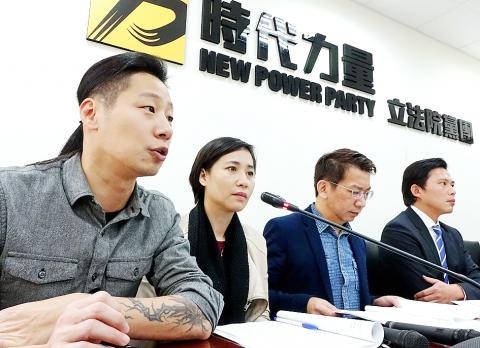The New Power Party (NPP) caucus yesterday proposed amendments to the Referendum Act (公民投票法) to lower referendum thresholds and the minimum voting age and switch to a plurality voting system.
At a post-caucus press conference, the NPP said it would modify the act to lower the signature threshold from 0.5 percent to 0.01 percent of the electorate to initiate a referendum proposal and lower the threshold to put a referendum proposal to a vote from 5 percent to 1.5 percent of the electorate.
“The Referendum Act is often described as a birdcage act, because its thresholds are set so high that it deprives people of their rights to referendum and makes referendums a tool of large parties capable of mobilizing a large number of voters,” NPP Legislator Hsu Yung-ming (徐永明) said.

Photo: Chu Pei-hsiung, Taipei Times
The party also proposed lowering the minimum voting age from 20 to 18, establishing absentee voting and shifting to a plurality voting system from the simple majority system, under which a referendum proposal is passed when more than 50 percent of eligible voters cast ballots and when more than 50 percent of the ballots cast are in approval of the proposal.
While average voter turnout is about 70 percent in Taiwan, the so-called “double-50-percent thresholds” are advantageous to opponents of a referendum proposal, because their parties can vote down a proposal simply by persuading 20 percent of the public not to vote, making the act unfair, Hsu said.
The NPP plans to revise the act to include Aborigines’ rights to be informed of and approve Aboriginal affairs, as well as allowing people to vote on modifications to territory.
NPP Legislator Kawlo Iyun Pacidal said many laws were made without taking into consideration the rights of Aborigines, and because they are minorities, the government should not resort to public votes to decide Aboriginal-related affairs, which should be determined by Aborigines themselves.
The party proposed to abolish a provision mandating the establishment of the Information and Communication Security Technology Center as an administrative institution of the Ministry of Science and Technology.
NPP Legislator Huang Kuo-chang (黃國昌) said that information security is national security, which should not be put in the hands of a low-level, semi-government body not invested with the power to investigate.
The center should not be formed as a research institute of the ministry, whose duties do not involve information security, but should be run as an independent, cyberpolice-like agency with investigative rights under the National Security Bureau or the Ministry of the Interior, Huang said.
National Cheng Kung University professor Li Jung-shian (李忠憲) said a semi-government security agency could actually harm information security, as the center’s employees are not government officials bound by government laws, meaning they might reveal sensitive data to China after they retire from the center.
“The hasty establishment of the center [as an entity run by the ministry] would only impede reformation, so the NPP proposes to abolish its establishment,” Huang said.

US climber Alex Honnold is to attempt to scale Taipei 101 without a rope and harness in a live Netflix special on Jan. 24, the streaming platform announced on Wednesday. Accounting for the time difference, the two-hour broadcast of Honnold’s climb, called Skyscraper Live, is to air on Jan. 23 in the US, Netflix said in a statement. Honnold, 40, was the first person ever to free solo climb the 900m El Capitan rock formation in Yosemite National Park — a feat that was recorded and later made into the 2018 documentary film Free Solo. Netflix previewed Skyscraper Live in October, after videos

NUMBERS IMBALANCE: More than 4 million Taiwanese have visited China this year, while only about half a million Chinese have visited here Beijing has yet to respond to Taiwan’s requests for negotiation over matters related to the recovery of cross-strait tourism, the Tourism Administration said yesterday. Taiwan’s tourism authority issued the statement after Chinese-language daily the China Times reported yesterday that the government’s policy of banning group tours to China does not stop Taiwanese from visiting the country. As of October, more than 4.2 million had traveled to China this year, exceeding last year. Beijing estimated the number of Taiwanese tourists in China could reach 4.5 million this year. By contrast, only 500,000 Chinese tourists are expected in Taiwan, the report said. The report

Temperatures are forecast to drop steadily as a continental cold air mass moves across Taiwan, with some areas also likely to see heavy rainfall, the Central Weather Administration (CWA) said. From today through early tomorrow, a cold air mass would keep temperatures low across central and northern Taiwan, and the eastern half of Taiwan proper, with isolated brief showers forecast along Keelung’s north coast, Taipei and New Taipei City’s mountainous areas and eastern Taiwan, it said. Lows of 11°C to 15°C are forecast in central and northern Taiwan, Yilan County, and the outlying Kinmen and Lienchiang (Matsu) counties, and 14°C to 17°C

STEERING FAILURE: The first boat of its class is experiencing teething issues as it readies for acceptance by the navy, according to a recent story about rudder failure The Hai Kun (海鯤), the nation’s first locally built submarine, allegedly suffered a total failure of stern hydraulic systems during the second round of sea acceptance trials on June 26, and sailors were forced to manually operate the X-rudder to turn the submarine and return to port, news Web site Mirror Daily reported yesterday. The report said that tugboats following the Hai Kun assisted the submarine in avoiding collisions with other ships due to the X-rudder malfunctioning. At the time of the report, the submarine had completed its trials and was scheduled to begin diving and surfacing tests in shallow areas. The X-rudder,